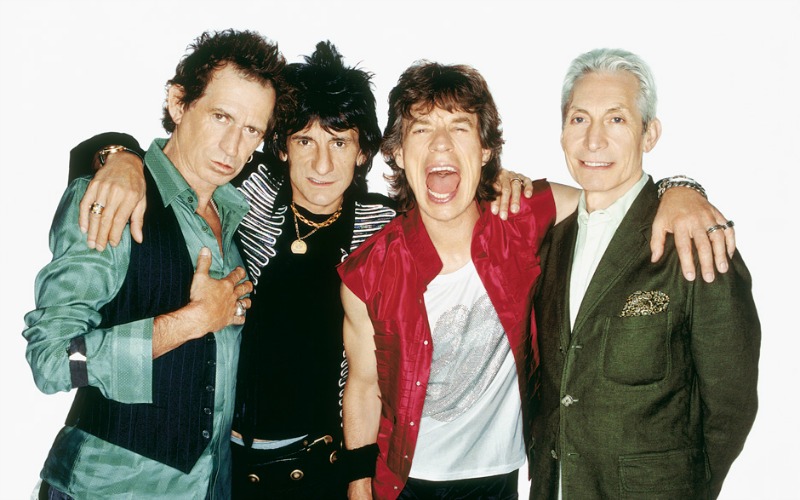
I was barely in my teens when I first heard The Rolling Stones’ song “Wild Horses”, and I was stunned. I had discovered rock music a few years before, but this was different in a way I couldn’t define. I bought the album Sticky Fingers, and played it hundreds of times, trying to puzzle out this new palette of unfamiliar feelings — visceral, full-body, gut-level. Finally, I understood: I was taking my first steps into adolescence, letting go of my childhood.
A few weeks ago, more than four decades later, I went to my first Rolling Stones concert. Forty-thousand people joined me, filling NC State’s football stadium. Our seats were on the field — close enough to clearly see the stage and the long catwalk into the audience. Gigantic screens showed Mick Jagger’s sweat in the North Carolina humidity, Keith Richards’ fingers as he owned the guitar, Ronnie Wood’s neon red shoe laces, Charlie Watts’ eyes as he merged with his drums to become one instrument.
The Stones took the stage, and instantly held the audience with a power that defied reason. Like his voice, Jagger’s movements have always been completely wrong. He’s jerky and slithery, grotesque and contorted. His presence should be a disturbing mistake. Instead, it’s a work of art.
Jagger, 71 years old, wore a black sequined jacket. He threw off a shoulder, shrugged it back on, tore it off entirely. Next, a shiny orange top, with a black spidery design, which he also tossed. Underneath was a clingy, black shirt. He jerked his shirt up slightly, then dropped it back down. He should have looked ridiculous, cringe-worthy embarrassing, but he hit it exactly right. Any more skin – the performance would have been a joke. Any less – Mick Jagger wouldn’t have been Mick Jagger.
Standing with my family on that hot summer night, I found myself thinking of another concert, many years ago. I was 17, in Los Angeles, when I saw Elton John at Dodger Stadium. That concert marked a rare adolescent turning point – rare because even in the throes of teen angst, I understood the importance of that pivotal moment. I stood with the people who had been my closest friends. We were at a juncture, about to separate on divergent paths. They would remain together, and I would set out on my own. Our breach was already in motion, and as Elton John walked onstage, I was sharply aware that this concert would mark the end of our time together, that our roads into adulthood needed to branch.
Throughout my childhood, I had watched the Dodgers play baseball from the stands, but I had never before stood on the field. I planted my feet, trying to find a new equilibrium, watching my friends dance. They were strongly bonded and at that point, I barely registered in their thoughts. I had already accepted that when I walked away, I wouldn’t be missed. I remember smiling at Elton John’s glittery outfits, amused by the mega-flash, surprised I could smile when my social world was about to crash. I wondered if I’d always associate Elton John’s music with loss.
He finished a set, and the audience went wild. But instead of launching into the next number, he stood quietly and in response, I felt myself turn quiet inside. An expectant hush swept through Dodger Stadium, and Elton John spoke. He said he was going to perform one of his personal favorites, a song often overlooked. He placed his hands on the keyboard, and the opening notes of “Tiny Dancer” filled the arena.
“Tiny Dancer” tells the story of a transporting love in a day-to-day reality. The music is simultaneously peaceful and charged, tender and edgy. Elton John’s voice blended with the piano, then pushed against the keyboard, soaring to new levels. As I listened, I suddenly understood what drew me to Elton John’s music. Unlike most singers, he didn’t treat his voice as the melody, and the piano as his back up. Instead, his voice and his piano were in a relationship, life partners, an intimate tapestry of blending, clashing, moving apart, reconnecting. And strangely, with that understanding, something shifted within me. I breathed deeply, and took a firm step away from the group — my first step into adulthood.
Decades later, on a different field 3,000 miles from Dodger Stadium, I stood strong and steady in a way I could never have imagined at 17. The Stones didn’t play “Wild Horses”, but they didn’t need to. I carry that song within me, next to “Tiny Dancer”. The Stones finished their encore, and acknowledged the back-up singers and musicians. Finally, the four band members stood alone: Mick Jagger, Keith Richards, Ronnie Wood, Charlie Watts. Four friends, lives intertwined, who created a new frontier of sound. As they stood with their arms around each other’s shoulders, I turned to look into the audience. Of course, people clapped and shouted, but many also cried. I wonder which first-steps in their lives were linked to the songs we heard that night, moving them to tears.
“Wild Horses” and “Tiny Dancer” mark two first-steps in my personal history. Like everyone, I carry hundreds of first-steps, each attached to a different song. I wonder where my next first-step will take me, and which song I’ll carry deep within, for the rest of my forever. Everyone has a first-step, a story, and a song. This is mine.

Amy Kaufman Burk
Amy Kaufman Burk is a novelist, blogger and mother of 3 grown children. She grew up in the film industry, which launched her on the path to feminism as a child. Amy’s first novel, Hollywood High: Achieve The Honorable, follows Caroline Black, an overly academic girl who transfers from a college prep academy to the local public high school with gangs, over 40 native languages, and extreme violence targeting the gay students. Her second novel, Tightwire, follows Caroline Black into her rookie year as a psychology intern, treating her first patient, a troubled young man who grew up in the circus. Clickhere to find out more about Amy.




Be the first to comment